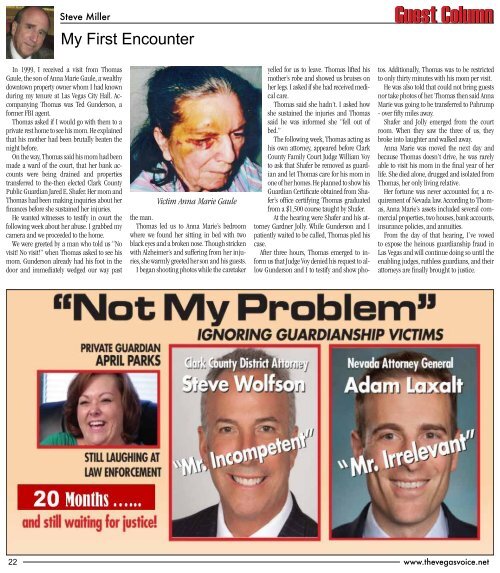vv 1-17 web
You also want an ePaper? Increase the reach of your titles
YUMPU automatically turns print PDFs into web optimized ePapers that Google loves.
Steve Miller<br />
My First Encounter<br />
Guest Column<br />
Robert Telles<br />
Seeking Assistance for a Ward<br />
In 1999, I received a visit from Thomas<br />
Gaule, the son of Anna Marie Gaule, a wealthy<br />
downtown property owner whom I had known<br />
during my tenure at Las Vegas City Hall. Accompanying<br />
Thomas was Ted Gunderson, a<br />
former FBI agent.<br />
Thomas asked if I would go with them to a<br />
private rest home to see his mom. He explained<br />
that his mother had been brutally beaten the<br />
night before.<br />
On the way, Thomas said his mom had been<br />
made a ward of the court, that her bank accounts<br />
were being drained and properties<br />
transferred to the-then elected Clark County<br />
Public Guardian Jared E. Shafer. Her mom and<br />
Thomas had been making inquiries about her<br />
finances before she sustained her injuries.<br />
He wanted witnesses to testify in court the<br />
following week about her abuse. I grabbed my<br />
camera and we proceeded to the home.<br />
We were greeted by a man who told us “No<br />
visit! No visit!” when Thomas asked to see his<br />
mom. Gunderson already had his foot in the<br />
door and immediately wedged our way past<br />
Victim Anna Marie Gaule<br />
the man.<br />
Thomas led us to Anna Marie’s bedroom<br />
where we found her sitting in bed with two<br />
black eyes and a broken nose. Though stricken<br />
with Alzheimer’s and suffering from her injuries,<br />
she warmly greeted her son and his guests.<br />
I began shooting photos while the caretaker<br />
yelled for us to leave. Thomas lifted his<br />
mother’s robe and showed us bruises on<br />
her legs. I asked if she had received medical<br />
care.<br />
Thomas said she hadn’t. I asked how<br />
she sustained the injuries and Thomas<br />
said he was informed she “fell out of<br />
bed.”<br />
The following week, Thomas acting as<br />
his own attorney, appeared before Clark<br />
County Family Court Judge William Voy<br />
to ask that Shafer be removed as guardian<br />
and let Thomas care for his mom in<br />
one of her homes. He planned to show his<br />
Guardian Certificate obtained from Shafer’s<br />
office certifying Thomas graduated<br />
from a $1,500 course taught by Shafer.<br />
At the hearing were Shafer and his attorney<br />
Gardner Jolly. While Gunderson and I<br />
patiently waited to be called, Thomas pled his<br />
case.<br />
After three hours, Thomas emerged to inform<br />
us that Judge Voy denied his request to allow<br />
Gunderson and I to testify and show photos.<br />
Additionally, Thomas was to be restricted<br />
to only thirty minutes with his mom per visit.<br />
He was also told that could not bring guests<br />
nor take photos of her. Thomas then said Anna<br />
Marie was going to be transferred to Pahrump<br />
- over fifty miles away.<br />
Shafer and Jolly emerged from the court<br />
room. When they saw the three of us, they<br />
broke into laughter and walked away.<br />
Anna Marie was moved the next day and<br />
because Thomas doesn’t drive, he was rarely<br />
able to visit his mom in the final year of her<br />
life. She died alone, drugged and isolated from<br />
Thomas, her only living relative.<br />
Her fortune was never accounted for, a requirement<br />
of Nevada law. According to Thomas,<br />
Anna Marie’s assets included several commercial<br />
properties, two houses, bank accounts,<br />
insurance policies, and annuities.<br />
From the day of that hearing, I’ve vowed<br />
to expose the heinous guardianship fraud in<br />
Las Vegas and will continue doing so until the<br />
enabling judges, ruthless guardians, and their<br />
attorneys are finally brought to justice.<br />
8197_SSHIX_OE_Jan_VegasVoice_FIN.pdf 1 12/21/16 4:21 PM<br />
You may have a friend who has had<br />
a guardianship ordered over him or<br />
her. This person may have complained<br />
about the fact that he or she did not<br />
have the opportunity to ask why the<br />
guardianship was ordered.<br />
In my own practice, I have come<br />
across circumstances where people<br />
over whom a guardianship was awarded<br />
never actually received the opportunity<br />
to object to the guardianship.<br />
This can result from a doctor’s erroneous<br />
opinion that the person could not<br />
speak his or her own opinion in court.<br />
This may result from the doctor’s belief<br />
that the person would not have the<br />
physical ability to attend court, would<br />
be unable to voice his or her opinion,<br />
or for some other reason. However, the<br />
guardianship court is concerned with<br />
ensuring that any person over whom<br />
a guardianship has been ordered have<br />
the ability to speak to the court.<br />
Really, only those who should be excused<br />
from attending court hearings<br />
would be a person who is unable to<br />
safely leave a hospitable bed or is truly<br />
a danger to him or herself or others.<br />
Those who have had a guardianship<br />
ordered over them are known as wards<br />
or protected persons. These folks are<br />
those who have shown to be a danger<br />
to him or herself or to others.<br />
This may include an inability to<br />
manage one’s own financial affairs or<br />
the inability to adequately maintain<br />
his or her own health without the assistance<br />
of others. This often includes<br />
those who have unfortunately been<br />
diagnosed with a disorder that erodes<br />
the memory, such as Alzheimer’s or<br />
dementia.<br />
Other circumstances may involve<br />
something more physically severe,<br />
such as an illness that confines that<br />
person to a hospital bed. The former<br />
circumstances, Alzheimer’s and dementia,<br />
may not necessarily call for<br />
an immediate confinement to involuntary<br />
commitment in a memory care<br />
unit.<br />
A memory care unit is a place where<br />
people are placed and are monitored<br />
on a 24-hour basis. As previously<br />
mentioned, this may not be the first<br />
option.<br />
Often times, the protected person<br />
has the money and the health necessary<br />
to continue living at home. Unfortunately,<br />
even loved ones can jump<br />
the gun and determine that the first<br />
option should be commitment to a<br />
memory care unit.<br />
What can be done? If you know<br />
someone who has not had the opportunity<br />
to address the court in his or her<br />
guardianship, that person can contact<br />
an attorney who can petition the court<br />
to allow the protected person to speak<br />
to the court. This can often result in a<br />
re-evaluation of the case and whether<br />
that person meets the necessary criteria<br />
to return home or a less confining<br />
arrangement.<br />
Unfortunately, even well-meaning<br />
family can jump the gun and move<br />
straight to a restrictive living arrangement<br />
for that person even when that<br />
person might be able to live in his or<br />
her own home with the assistance of<br />
some paid help.<br />
If you believe you know someone<br />
living in restrictive living arrangement<br />
unnecessarily, be sure to have<br />
that person contact a qualified guardianship<br />
attorney.<br />
Rob Telles is the founder of Accolade Law, a law firm that serves clients in<br />
guardianship, estate planning and probate. His office can be reached at (702) 337-<br />
3000<br />
22 www.thevegasvoice.net<br />
january <strong>17</strong><br />
23

















